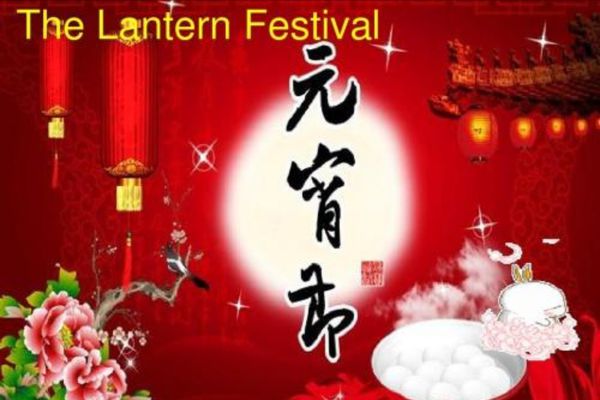2019-11-26 14:01:24来源:用考网综合
正月是农历的元月,古人称夜为“宵”,所以称正月十五为元宵节。元宵节又称为“上元节”。按中国民间的传统,在这天人们要点彩灯、猜灯谜、吃元宵。小伙伴们知道元宵节相关的英语表达吗?一起来学习吧!

theLanternFestival元宵节
riceglueball元宵
glutinousrice糯米
lions/dragonsdancing舞龙/舞狮
guesslanternriddles猜灯谜
playcoupletsgame对对联
enjoybeautifullanterns赏花灯
snuff灯花
exhibitoflanterns灯会
dragonlanterndancing耍龙灯
walkingonstilts踩高跷
landboatdancing划旱船
yangko/yanggedance扭秧歌
drumdance腰鼓舞
fireworksparty焰火大会
traditionalopera戏曲
varietyshow/vaudeville杂耍
LanternFestival'stemplefair元宵庙会
colored lanterns'templefair彩灯庙会
元宵节的意义
The Lantern Festival falls on the 15th day of the 1st lunar month. It is the first full moon of the new year, symbolizing unity and perfection.
元宵节在农历第一个月的十五号,它是新的一年的第一次满月,象征着团圆和美。
元宵节的起源
the Han Dynasty(206BC-220AD), Buddhism flourished all over China. One emperor heard that Buddhism monks would watch sarira , or remains from the cremation of Buddha's body , and light laterns to worship buddha on the 15th day of the 1st lunar month, so he ordered to light laterns in the imperial palace and temples to show respect to Buddha on this day. Later, the Buddhist rite developed into a grand festival among common people and its influence expanded form the Central Plains to the whole China.
东汉明帝时期,明帝提倡佛教,听说佛教有正月十五日僧人观舍利,点灯敬佛的做法,就命令这一天夜晚在皇宫和寺庙里点灯敬佛,令士族和庶民都挂灯。以后这种佛教礼仪节日逐渐演变为民间盛大的节日。元宵节经历了由宫廷到民间,由中原到全国的发展过程。
元宵节的习俗
中国传统的过年,一般要持续到元宵节,元宵节一过也象征过年的结束,人们就要恢复正常的生产和生活了。在元宵节期间,人们举行各种民俗活动,赏月、观花灯、猜灯谜、放烟花、舞龙灯、舞狮子、跑旱船、踩高跷、扭秧歌,普天同庆,其乐融融。元宵节也成为中国诸多传统节日当中最热闹的一个,可以称为中国的“狂欢节”。
元宵习俗
guess the riddle 猜灯谜
play the dragon latern 耍龙灯
lion dance 舞狮子
a land boat dance 划旱船
stilt walk 踩高跷
yangko 扭秧歌
enjoy the beautiful laterns 赏花灯
set off fire works 放烟花
play couples game 对对联
have tangyuan/yuanxiao 吃汤圆/元宵
元宵节常用英语
the Lantern Festival 元宵节
rice glue ball 元宵
glutinous rice 糯米
lions/dragons dancing 舞龙/舞狮
guess lantern riddles 猜灯谜
play couplets game 对对联
enjoy beautiful lanterns 赏花灯
snuff 灯花
exhibit of lanterns 灯会
dragon lantern dancing 耍龙灯
walking on stilts 踩高跷
land boat dancing 划旱船
yangko/yangge dance 扭秧歌
beating drums while dancing 打太平鼓
drum dance 腰鼓舞
fireworks party 焰火大会
traditional opera 戏曲
variety show/vaudeville 杂耍
Lantern Festival's temple fair 元宵庙会
colored lanterns' temple fair 彩灯庙会
吃元宵
People will eat yuanxiao, or rice dumplings, on the Lantern Festival, so it is aslo called the “Yuanxiao Festival”, Yuanxiao also has another name, tangyuan. It is small dumpling balls made of glutionous rice with rose petals, sesame, bean paste, walnut meat, dried fruit, sugar and edible oil as filling. Tangyuan can be boiled, fried or steamed. It tastes sweet and has the meaning of reunion. So people eat them to denote union, harmony and happiness for the family.
民间过元宵节都会吃元宵。元宵由糯米制成,或实心,或带馅,馅有豆沙、白糖、山楂、各类果料等。食用时煮、炸、蒸皆可。起初,人们把这种食物叫作“浮圆子”,后来又叫汤团或汤圆,这些名称与“团圆”字音相近,取团圆之意,象征全家人团团圆圆和睦幸福。
猜灯谜
"Guessing lantern riddles"is an essential part of the Festival. Lantern owners write riddles on a piece of paper and post them on the lanterns. If visitors have solutions to the riddles, they can pull the paper out and go to the lantern owners to check their answer. If they are right, they will get a little gift. The activity emerged during people's enjoyment of lanterns in the Song Dynasty (960-1279). As riddle guessing is interesting and full of wisdom, it has become popular among all social strata.
猜灯谜也是元宵节活动的一个基本组成部分。灯笼的所有者将谜语写在一张纸条上,然后将纸条展示在灯笼上。如果赏灯者猜出谜语,就将纸条取出,然后找灯笼所有者确认答案。打对的话,他们就可以领取一份小礼品。这个活动起源于宋朝(960——1279)。猜灯谜活动极富情趣和智慧,因此在全社会广受欢迎。